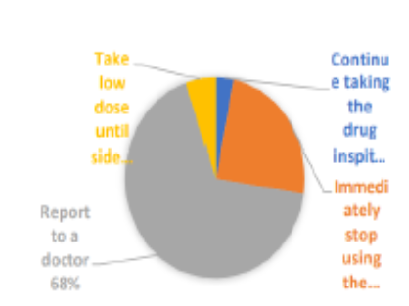


Journal of Pharmaceutical Research
DOI: 10.18579/jopcr/v24.i1.122
Year: 2025, Volume: 24, Issue: 1, Pages: 22-27
Original Article
A T Sathiya Vinotha1,∗, S Bhuvaneshwari2, A Vijayamathy3, M S Umamageswari1, S Jeevithan4, A Monisha5, Swetha Prakash5
1Professor, Department of Pharmacology, KMCH Institute of Health Sciences & Research, Coimbatore, Tamil Nadu, India
2Professor & Head, Department of Pharmacology, KMCH Institute of Health Sciences & Research, Coimbatore, Tamil Nadu, India
3Associate Professor, Department of Pharmacology, Karuna medical college, Palakkad, Kerala, India
4Professor, Department of Community Medicine, KMCH Institute of Health Sciences & Research, Coimbatore, Tamil Nadu, India
5CRMI, KMCH Institute of Health Sciences & Research, Coimbatore, Tamil Nadu, India
*Corresponding Author
Email: [email protected]
As a form of self-medication, Over-the-counter (OTC) drugs are commonly used by medical students. To use over-the-counter medications safely, students must have the adequate knowledge, attitude, and practice (KAP) about these medications and the associated adverse effects. The aim of this study was to assess the undergraduate medical students’ knowledge, attitude and practice toward over the counter drugs. This was a cross-sectional study, and a self-administered questionnaire was used to collect the data. To determine the association between KAP and OTC use, Chi-square analysis and multivariable logistic regression analysis were done. The total students included in the study was 402. 8.35 was the mean knowledge score with minimal variation between gender and phase of study. Awareness of the implications of OTC drug expiry was high, with 82.1% rejecting the expired drugs use. The average score was 2.75 for attitude. 42.3% of respondents agreed over-the-counter medications are more affordable and handier, indicating a mixed attitude and 40% remained neutral. Sharing OTC medications was generally discouraged, with only 18.7% in favour and 32.3% disagreeing. A strong majority (67.4%) agreed that expert advice should be sought when using unfamiliar OTC medications. Practice scores differed significantly across student phases (p < 0.001) suggesting education positively influences safe OTC drug use. This study reflects good training and awareness of undergraduate medical students on OTC drugs. Some students were unsure about specific risks of OTC drug interactions and storage conditions, indicating areas for targeted educational interventions.
Keywords: Self-medication, Undergraduate medical students, Over-the-counter
© 2024 Published by Krupanidhi College of Pharmacy. This is an open-access article under the CC BY-NC-ND license (https://creativecommons.org/licenses/by-nc-nd/4.0/)
Subscribe now for latest articles and news.